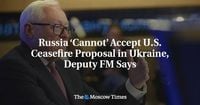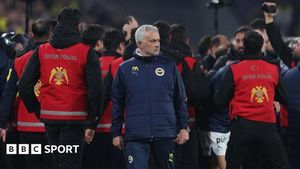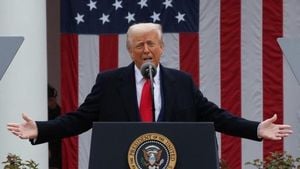MOSCOW, April 1 (Xinhua) -- Tensions continue to rise as Russia and the United States engage in complex negotiations to resolve the ongoing conflict in Ukraine. Kremlin spokesman Dmitry Peskov confirmed on Tuesday that discussions are ongoing, but warned that the situation remains intricate and challenging. "We are continuing to maintain contact with the United States," Peskov stated during a daily briefing, addressing concerns over potential new sanctions from the U.S. on Russia's oil industry if peace talks do not yield substantial progress.
Peskov's comments came in the wake of Russian Deputy Foreign Minister Sergey Ryabkov's remarks earlier that day, emphasizing that Russia cannot accept U.S.-backed proposals without addressing what it views as the "root causes" of the war. Ryabkov articulated this position in an interview published by the Russian Foreign Ministry’s journal, International Affairs. "We take the Americans’ proposed models and solutions very seriously, but we also cannot accept them as is," he noted, highlighting Russia's insistence on a more comprehensive approach to peace.
U.S. President Donald Trump has expressed a desire for a swift resolution to the conflict, which has persisted for over three years. However, negotiations between his administration, Russia, and Ukraine have yet to produce any significant breakthroughs. Trump’s administration has been under scrutiny for its handling of the situation, particularly after Russian President Vladimir Putin rejected a joint U.S.-Ukrainian plan for a broad 30-day ceasefire. In a controversial move last month, Putin even suggested that Ukrainian President Volodymyr Zelensky should be removed from office as part of the peace process.
On March 30, 2025, Trump expressed his frustration during an interview with NBC News, stating he was "pissed off" at Putin for questioning Zelensky’s credibility as a negotiating partner. This statement underscores the increasing tensions not only between the U.S. and Russia but also within the dynamics of the Ukrainian leadership. The Kremlin responded to Trump’s remarks, reiterating that Putin remains open to dialogue with the U.S. leader, who later indicated he expects Putin to "fulfill his part" of a peace deal.
Despite these diplomatic overtures, Ryabkov warned that Moscow sees no signs from either Trump or Ukraine that could lead to an end to the war beyond the proposed 30-day ceasefire. He stressed that the U.S. plans do not adequately address Russia’s primary demand of resolving issues related to the conflict's root causes. This insistence reflects a broader narrative from Russian officials, who have frequently invoked the term "root causes" in discussions about the conflict.
Putin himself articulated these root causes last June, stating that they include Ukraine's withdrawal from regions partially controlled by Russia and its abandonment of aspirations to join NATO. This perspective remains central to Russia's stance in ongoing negotiations, complicating the already fraught discussions with the U.S. and Ukraine.
The situation in Ukraine has continued to deteriorate, with both sides suffering significant losses. As the conflict enters its fourth year, the international community watches closely, hoping for a breakthrough that could lead to lasting peace. However, with entrenched positions on both sides and a lack of mutual trust, the path to resolution appears more challenging than ever.
As the U.S. considers further sanctions, the Kremlin's response will be critical in shaping future negotiations. Peskov's acknowledgment of the complexity of the issue suggests that both sides may need to engage in more substantial dialogue to avoid further escalation. The stakes are high, not just for Ukraine but for international relations as a whole.
The ongoing conflict in Ukraine is not only a regional issue but also a significant point of contention in global geopolitics. With both the U.S. and Russia holding firm to their respective positions, the potential for a diplomatic resolution remains uncertain. Observers are left wondering whether the latest round of talks will lead to any meaningful progress or if the conflict will continue to fester, drawing in further international involvement.
In conclusion, as Russia and the United States navigate these complex negotiations, the focus remains on finding a viable solution that addresses the underlying issues of the Ukraine conflict while balancing the interests of both nations. The coming weeks will be crucial in determining the direction of this protracted conflict and the possibility of peace.





